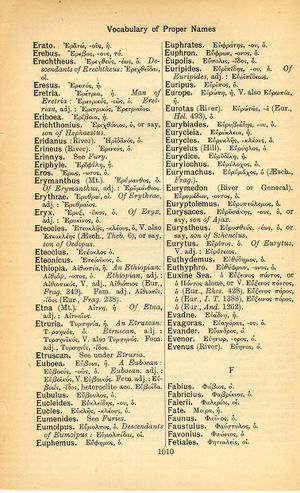Eretria: Difference between revisions
κακοὶ μάρτυρες ἀνθρώποισιν ὀφθαλμοὶ καὶ ὦτα βαρβάρους ψυχὰς ἐχόντων → eyes and ears are poor witnesses for men if their souls do not understand the language (Heraclitus Phil.: Fr. B 107; Testimonia: Fragment 16, line 6)
(6_6) |
|||
| Line 7: | Line 7: | ||
}} | }} | ||
{{Lewis | {{Lewis | ||
|lshtext=<b>Ĕrĕtrĭa</b>: ae, f., = Ἐρετρία.<br /><b>I</b> The [[principal]] [[city]] on the [[island]] of [[Euboea]], the birthplace of the [[philosopher]] [[Menedemus]], [[now]] Palaeo Castro, Plaut. Merc. 3, 4, 59; Mel. 2, 7, 9; Plin. 4, 12, 21, § 64; Cic. Ac. 2, 42; Liv. 32, 16; 35, 38 al.—<br /> <b>B</b> Derivv.,<br /> <b>1</b> Ĕrĕtrĭus, a, um, adj., Eretrian: [[creta]], Plin. 33, 13, 57, § 163; so, [[terra]], Cels. 5, 15; 6, 3.—Subst.: [[Eretria]], ae, f., Plin. 35, 6, 21, § 38; Vitr. 7, 14.—<br /> <b>2</b> Ĕrĕtrĭ-[[ensis]], e, adj., of [[Eretria]]: Gongylus, Nep. Paus. 2.—Subst., Ĕrĕtrienses, ium, m., the inhabitants of [[Eretria]], Liv. 35, 38.—<br /> <b>3</b> Ĕrĕtrĭăci, ōrum, m., philosophers of the [[school]] of [[Menedemus]], Cic. Ac. 2, 42, 109. —Also called,<br /> <b>4</b> Ĕrĕtrĭci, ōrum., m., Cic. de Or. 3, 17; Sen. Ep. 88 fin.—In | |lshtext=<b>Ĕrĕtrĭa</b>: ae, f., = Ἐρετρία.<br /><b>I</b> The [[principal]] [[city]] on the [[island]] of [[Euboea]], the birthplace of the [[philosopher]] [[Menedemus]], [[now]] Palaeo Castro, Plaut. Merc. 3, 4, 59; Mel. 2, 7, 9; Plin. 4, 12, 21, § 64; Cic. Ac. 2, 42; Liv. 32, 16; 35, 38 al.—<br /> <b>B</b> Derivv.,<br /> <b>1</b> Ĕrĕtrĭus, a, um, adj., Eretrian: [[creta]], Plin. 33, 13, 57, § 163; so, [[terra]], Cels. 5, 15; 6, 3.—Subst.: [[Eretria]], ae, f., Plin. 35, 6, 21, § 38; Vitr. 7, 14.—<br /> <b>2</b> Ĕrĕtrĭ-[[ensis]], e, adj., of [[Eretria]]: Gongylus, Nep. Paus. 2.—Subst., Ĕrĕtrienses, ium, m., the inhabitants of [[Eretria]], Liv. 35, 38.—<br /> <b>3</b> Ĕrĕtrĭăci, ōrum, m., philosophers of the [[school]] of [[Menedemus]], Cic. Ac. 2, 42, 109. —Also called,<br /> <b>4</b> Ĕrĕtrĭci, ōrum., m., Cic. de Or. 3, 17; Sen. Ep. 88 fin.—In sing.: Ĕrĕtrĭcus, an Eretrian [[philosopher]], Cic. Tusc. 5, 39.—<br /><b>II</b> A [[city]] of [[Thessaly]], in Phthiotis, [[now]] Tzangli, Liv. 32, 13; 33, 6. | ||
}} | }} | ||
Revision as of 09:25, 13 August 2017
English > Greek (Woodhouse)
Ἐρέτρια, ἡ.
Man of Eretria: Ἐρετριεύς, -ιῶς, ὁ.
Eretrian, adj.: Ἐρετρικός, Ἐρετριαῖος.
Latin > English (Lewis & Short)
Ĕrĕtrĭa: ae, f., = Ἐρετρία.
I The principal city on the island of Euboea, the birthplace of the philosopher Menedemus, now Palaeo Castro, Plaut. Merc. 3, 4, 59; Mel. 2, 7, 9; Plin. 4, 12, 21, § 64; Cic. Ac. 2, 42; Liv. 32, 16; 35, 38 al.—
B Derivv.,
1 Ĕrĕtrĭus, a, um, adj., Eretrian: creta, Plin. 33, 13, 57, § 163; so, terra, Cels. 5, 15; 6, 3.—Subst.: Eretria, ae, f., Plin. 35, 6, 21, § 38; Vitr. 7, 14.—
2 Ĕrĕtrĭ-ensis, e, adj., of Eretria: Gongylus, Nep. Paus. 2.—Subst., Ĕrĕtrienses, ium, m., the inhabitants of Eretria, Liv. 35, 38.—
3 Ĕrĕtrĭăci, ōrum, m., philosophers of the school of Menedemus, Cic. Ac. 2, 42, 109. —Also called,
4 Ĕrĕtrĭci, ōrum., m., Cic. de Or. 3, 17; Sen. Ep. 88 fin.—In sing.: Ĕrĕtrĭcus, an Eretrian philosopher, Cic. Tusc. 5, 39.—
II A city of Thessaly, in Phthiotis, now Tzangli, Liv. 32, 13; 33, 6.

